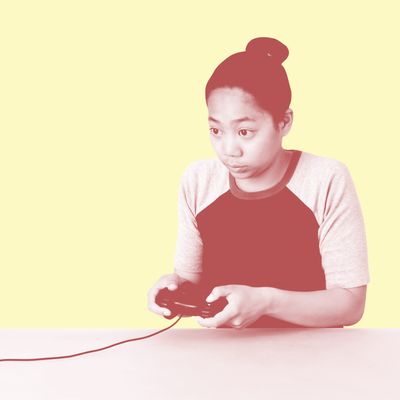
We’ve heard a lot about women getting harassed online, and people have a lot of ideas about how to fix it, but sometimes the conversation is short on nuance and evidence. Last year’s highly touted U.N. report on cyberharassment, for example, was a big mess.
Gaming is, naturally, a key site of a lot of this harassment, so digging into the experiences of gamers can shine a lot of light on this subject. In a new paper in Media & Society, the Ohio State researchers Jesse Fox and Wai Yen Tang sought to do just that, to better understand female gamers’ experiences with online harassment by, well, asking them. Fox and Tang reached out to a bunch of online groups to find a sample of female online gamers and, after tossing out the data of those who didn’t fill out enough of the questions, were left with a group who spent a significant amount of time gaming: 293 women who played about 22 hours a week, on average.
The cornerstone of the survey the women took was a group of questions designed to get at the forms of harassment they’d dealt with — “A total of 11 items measured general harassment, such as swearing or insulting a player’s skill,” the authors note. “Eight items measured sexual harassment, such as sexist comments, being asked for sexual favors, and rape jokes and threats.” The women were also asked how they responded to and coped with the harassment they received — did it cause them to ruminate? Did they reach out to others for help? Did they end up quitting the game to get away from it?
The key finding here, as summed up in the paper’s abstract, is that “Both general and sexual harassment predict women’s withdrawal from online games. Sexual harassment, but not general harassment, leads to rumination and subsequent withdrawal.” Rumination, in turn, is linked (not in this paper but more generally) with depressive symptoms and other negative outcomes — if harassment leads someone to continually mull over what was said to them, that’s potentially not good for their mental health. Sexual harassment, perhaps unsurprisingly, seems to have an effect that “haha u suck and r dumb” does not.
There are some important limitations here. The biggest one is response bias: The authors don’t claim this to be a representative sample (I’m not even sure we have enough data to know what a “representative sample” would mean, exactly, in terms of female gamers), but the way Fox and Tang recruited participants — by asking them, as they summarized it, to take “an online survey on experiences with trash talking and harassment in video games” — seems very likely to disproportionately draw in women who have experienced particularly nasty trash-talking, harassment, or both. That could be part of the point, to first ask women who have dealt with some of the worst harassment, but in a follow-up study, it might be useful to get a sample of women who play, say, 15 hours or more of video games a week, and see if their experiences and coping strategies are different. (As a side note, it would also be interesting to poll men who have dealt with sexual harassment online and see if it hits them as hard — though they appear to be a significantly smaller group.)
Still, though, this is an important line of inquiry. Past research from Pew, after all, has shown that when you take a zoomed-out approach, men and women deal with overall similar levels of harassment online — it’s only when you look at younger online denizens, and zoom in to the worst, most-harmful-seeing sorts of behaviors, like stalking, sexual harassment, and sustained harassment, that the big gender differences emerge. It’s important to better understand the impact of this sort of behavior.




